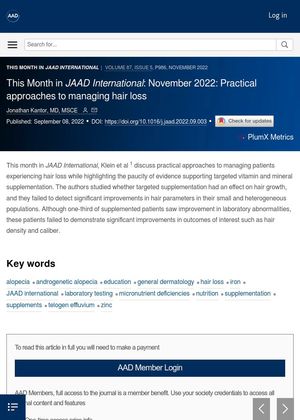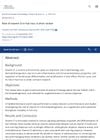This Month in JAAD International: November 2022: Practical Approaches to Managing Hair Loss
September 2022
in “
Journal of the American Academy of Dermatology
”

TLDR Taking specific vitamins and minerals did not significantly improve hair growth in people with hair loss.
Klein et al. discuss practical approaches to managing hair loss, emphasizing the lack of strong evidence for targeted vitamin and mineral supplementation. Their study, involving a small and diverse group of patients, found no significant improvements in hair growth parameters such as hair density and caliber despite some patients showing improvements in laboratory abnormalities. This highlights the need for more robust research to support the efficacy of such supplements in treating hair loss.





